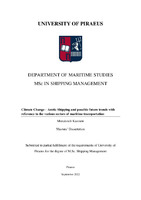Climate change - Arctic shipping and possible future trends with reference to the various sectors of maritime transportation

Master Thesis
Συγγραφέας
Μαξακούλη, Κασσιανή
Maxakouli, Kassiani
Ημερομηνία
2022-09Επιβλέπων
Τσελεπίδης, ΑναστάσιοςΠροβολή/
Λέξεις κλειδιά
Climate changeΠερίληψη
Global warming that refers to climate change has become a hot topic on the international agenda. One of the issues receiving much attention has been the Arctic, not only for regional states, but also for countries that are geographically remote from this part of the world. Over the past 49 years, the Arctic has warmed three times faster than the world as a whole, leading to rapid and widespread changes in sea ice, land ice, snow cover, and other physical features and characteristics of the Arctic environment.
Ship traffic is increasing in the Arctic, facilitated by reduction in sea ice cover and ice thickness as a result of global warming, resulting in greater marine access and longer navigation seasons. The future reduction in sea ice will bring with it a new set of challenges and risks.
The future is uncertain. If Arctic ice coverage continues to be reduced at the rates it has been, then it is highly likely that it will become an area of marine activity. Future development of Arctic shipping will depend on predictability and economy-of-scale, all of which are currently limited due to regulators and the governance of shipping activities that are characterized by efforts to promote maritime regulations, procedures, security and protection of the environment from damage by accidents, well as harmonization and uniformity in international maritime law and standards.


